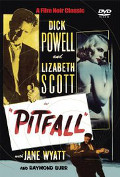
Directed by
Andre de Toth
85 minutes
Rated PG
Reviewed by
Bernard Hemingway

Pitfall
A typical 40s B movie, Pitfall is one of those films which are more interesting for what they say about Hollywood film-making of the time than in themselves. The interest here lies in the disjunction between the two sensibilities of fatalistic film noir and stern morality play which the film straddles as it tells the story of what happens when decent and proper American citizens stray from the straight and narrow.
Dick Powell plays an insurance agent married to his high school sweetheart (Jane Wyatt) and tired of his routine suburban existence. Whilst investigating a case he meets sultry femme fatale Mona Stevens (Lizabeth Scott) and his downfall is assured.
Based on a novel by Jay Dratler, the screenwriter responsible for Laura (1944) and Call Northside 777 (1948), the script is an uneven affair, mixing hard-boiled dialogue with suburban cosiness in incongruous ways, particularly noticeable in the relationship between Powell’s John Forbes and his young son, who surely is a candidate for late '50s rebel-without-a-cause angst. The most problematic aspect however is in dealing with the relationship between Forbes and Stevens – is she a man-eater, a virgin-whore, a wronged woman? Perhaps the moral strictures of the times made it difficult to make it explicit (this is one film where a fade to black after the lover’s kiss actually does us a disservice) but it takes quite a bit of reading between the lines to conclude that anything sexual did occur between the two. If it was Dorothy Malone instead of Scott playing the part matters would probably be clearer but the latter leans the role more towards the Lauren Bacall end of the quality spectrum (she doesn’t mess around with married men) and that jars with the general noi-rish seediness with which much of the film is imbued, a good deal of it thanks to Harry Wild's cinematography (on the other hand a back-projected scene with Powell and Scott in a speedboat, Powell with his hat still on, is truly awful).
If Powell, who spits out his dialogue like he was still playing Philip Marlow in Murder, My Sweet (1944) is at best serviceable as the errant husband, Scott is, as usual, a striking presence and if made today this would be her film whilst Raymond Burr does some good work with his perfunctory B-grade character of the bully-boy obsessed with Scott’s charms.The story’s resolution, which has Forbes crawling back to his suburban rut and Wyatt’s apron strings, is a truly frightening example of ideological manipulation. At least from this perspective one can only say “Poor John".
What is perhaps the most interesting aspect of the film today is the treatment of Scott/Stevens. Not only does the film make much of Scott's allure, frequently framing her face with her eyes high-lit in the typical period fashion but Powell's character first sees her as a series of photographs following on Burr's lascivious verbal report of her appeal and even after meeting her (nattily attired in shorts) he returns to the images. In another quite improbable scene, one which suggests a Peeping Tom style "photographic" studio setting, she is required to model dresses for the drooling Burr. Seemingly speaking directly to this idea of the woman as image in one scene Forbes explains to his son who has had a nightmare as a result of reading comic books that the mind is like a camera and in another when Mona meets her boyfriend, Smiley fresh out of jail and says how much better things are now that they are no longer divided by a screen he replies that perhaps it was better when there was a screen, What fan of film noir would disagree?
Want something different?





